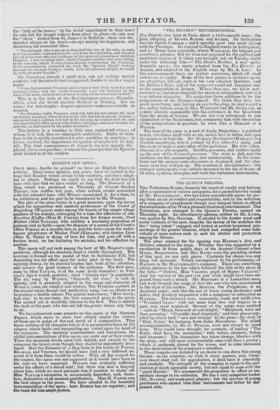BISHOP'S NEW OPERA.
ONCE more, Apollo be praised ! we have an English Opera to criticise. Many weary months, nay years, have we waited in the hope that BISHOP would return to his vocation, and leave adapt- ing to others. Perhaps we ought to say that the fault has not been with him that we have waited so long. The Romance of a Day, which was produced on Thursday at Covent Garden Theatre, was written last year, when certain events connected with the intended hero (Mr. Wool)) occasioned it, for a time, to be withdrawn, and his part to be transferred to Mr. WILSON. The plot of the piece turns, in a great measure, upon the havoc which the appearance and amatory professions of the Count of Engleberg (WiLsoN) make among the hearts of the simple village maidens of his domain, estranging for a time the affections of one Karoline K7afen (Miss H. CAwsa) from her former swain, Paul Richter (MISS TAYLOR), who exhibits a becoming proportion of jealousy and so forth—upon the disguise of a cousin of the Count's (Miss FORDE) as a country lass, to gain his love—upon the unfor- tunate adventures of Master Fritz (KEELEy), who fancies Liese (Miss E. Tim) is dying of love for him, and goes off with a broken heart, on her declaring his mistake, and her affection for another.
This opera will not rank among the best of Mr. BISHOP'S com- positions, although his masterly hand is visible throughout. The overture is formed on the model of that to Guillaume Tell, but depending less for effect upon the noisy part of the band. The opening chorus, by its cheerful burden lays hold of the attention, and insures the good humour of the audience. The first song, sung by Miss TAYLOR, is of the same lively character : in VES• TRIS'S lips it would, probably, rival "Cherry ripe" in popularity. The air, sung by WILSON, "Farewell, for ever," is rich in melody, and is precisely adapted to the range and character of Woon's, voice, for which it was written. The Tyrolean quintett, in the second scene, though but moderately sung, was so effective as to produce a double encore. The quintet and chorus, "How lovely, how fair," is, to our taste, the best concerted piece in the opera. The second act is decidedly inferior to the first. This is mainly the fault of the poet, who has not left his prima donna any thing to do.
We have observed some remarks on this opera in the Morning Papers, which serve to show how utterly linable the writers of them are to judge of the real merit of a composition. They !mow nothing of its character but as it is presented to them by the singers, whose faults and incapacities are visited upon the head of the composer. The masterly combinations and transitions, the skilful instrumentations of this opera, are quite out of their reach. These the musician dwells upon with delight, and awards to the composer his laurel, even though they should be imperfectly deve- loped. Had the Romance of a Day been in the hands of PATON, BRAHAM, and VESTRIS, we should have had a very different ac- count of it from these would-be critics. 'With all due respect for the singers, the opera was not supported as it would have been in the case we have supposed. WILSON was evidently suffering under the effects of a recent cold; but there was also a languor about him, which we must persuade him if possible to shake off. bliss TAYLOR'S intonation is occasionally imperfect, and, there- fore, destructive of all musical gratification. Miss H. CAWSE was the best singer in the piece. We have alluded to the beautiful instrumentation of the opera: here BISHOP has no superior; and the band did him ample justice.


























 Previous page
Previous page